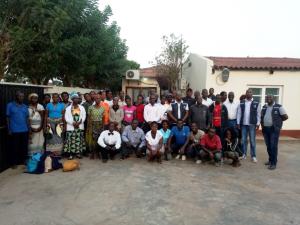WHO supports DPS with Trainings for Community Based Surveillance Focal Points
BEIRA, Mozambique – The training for community epidemiological surveillance focal points was carried out in Búzi district, by the Sofala Provincial Directorate of Health (DPS) with technical and financial support from the World Health Organization (WHO). 40 people from 8 resettlement sites who are most affected by Cyclone Idai participated in the training.
The training was organized to build capacity for Community Based Surveillance (CBS) while engaging community focal points in the referral system, especially in the hard-to-reach areas and resettlement sites. In the two days’ training sessions, the participants could equip themselves with essential knowledge on case definition, transmission and preventive measures of diseases: Poliomyelitis, Measles, Neonatal Tetanus, Cholera, Malaria and Pellagra.
In the month of July, WHO also supported trainings conducted in the districts of Nhamatanda and Dondo for 15 and 13 participants, which are from 3 resettlement sites respectively, having 68 participants in total for the entire training sessions.
On the last day of each training, bicycles purchased by WHO were handed over to the Community Based Epidemiological Surveillance focal points; 3 for Nhamatanda, 3 for Dondo and 8 for Búzi. This will facilitate communication between the focal points and health workers at the facilities. This is also expected to help sensitizing on disease prevention in the resettlement sites and remote areas.
Búzi District Administrator Maria Bernardete Roque called for prompt action from the focal points. “DPS developed this training to address livelihood challenges and increased risk of diseases caused by Cyclone Idai thanks to WHO’s support. I hope you have taken full advantage of this opportunity so that you can play an important role in delivering key messages about diseases addressed in respective resettlement sites,” she said.
The trainings have brought together DPS and WHO’s commitment and efforts for better health in Mozambique and encourage active engagement of communities in health promotion and disease prevention.




